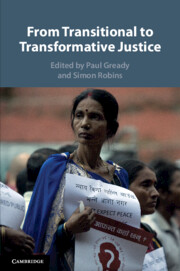Crossref Citations
This Book has been
cited by the following publications. This list is generated based on data provided by Crossref.
Ambos, Kai
2015.
Assessing the Efficiency of Transitional Justice.
SSRN Electronic Journal,
Sharp, Dustin N.
2019.
What Would Satisfy Us? Taking Stock of Critical Approaches to Transitional Justice.
SSRN Electronic Journal ,
Davidovic, Maja
2020.
Transform or perish? The crisis of transitional justice.
Conflict, Security & Development,
Vol. 20,
Issue. 2,
p.
293.
Hoddy, Eric T.
and
Gready, Paul
2020.
From agency to root causes: addressing structural Barriers to transformative justice in transitional and post-conflict settings.
Contemporary Social Science,
Vol. 15,
Issue. 5,
p.
561.
Killean, Rachel
and
Dempster, Lauren
2021.
Mass Violence, Environmental Harm and the Limits of Transitional Justice.
SSRN Electronic Journal,
Lambourne, Wendy
2021.
Resilience, Adaptive Peacebuilding and Transitional Justice.
p.
46.
Mieszkalski, Grace
and
Zyla, Benjamin
2021.
Engaging Displaced Populations in a Future Syrian Transitional Justice Process.
p.
65.
Clark, Janine Natalya
and
Ungar, Michael
2021.
Resilience, Adaptive Peacebuilding and Transitional Justice.
Immler, Nicole L.
2021.
What is Meant by ‘Repair’ when Claiming Reparations for Colonial Wrongs? Transformative Justice for the Dutch Slavery Past.
Esclavages & Post-esclavages,
Mieszkalski, Grace
and
Zyla, Benjamin
2021.
Engaging Displaced Populations in a Future Syrian Transitional Justice Process.
p.
133.
Conley, Bridget
2021.
Slippage: Bones, intentions, and the construction of memorial meaning.
Violence: An International Journal,
Vol. 2,
Issue. 1,
p.
24.
Hoddy, Eric T.
2021.
Peasants' rights and agrarian violence in transitional settings: From transitional justice to transformative agrarian justice.
Journal of Human Rights,
Vol. 20,
Issue. 1,
p.
91.
Martín, Héctor Centeno
Wiebelhaus-Brahm, Eric
Nieto-Librero, Ana Belén
and
Wright, Dylan
2022.
Explaining the timeliness of implementation of truth commission recommendations.
Journal of Peace Research,
Vol. 59,
Issue. 5,
p.
710.
McEvoy, Kieran
Lawther, Cheryl
and
Moffett, Luke
2022.
Changing the Script: Non-State Armed Groups, Restorative Justice and Reparations.
Journal of Human Rights Practice,
Vol. 14,
Issue. 2,
p.
454.
Cahill-Ripley, Amanda
and
Graham, Luke David
2022.
Using Community-Based Truth Commissions to Address Poverty and Related Economic, Social and Cultural Rights Violations: The UK Poverty Truth Commissions as Transformative Justice.
Journal of Human Rights Practice,
Vol. 13,
Issue. 2,
p.
225.
Gready, Simeon
2022.
The Case for Transformative Reparations: In Pursuit of Structural Socio-Economic Reform in Post-Conflict Societies.
Journal of Intervention and Statebuilding,
Vol. 16,
Issue. 2,
p.
182.
Hoddy, Eric T
2022.
Transformative Justice in Practice: Reflections on the Pastoral Land Commission During Brazil’s Political Transition.
Journal of Human Rights Practice,
Vol. 13,
Issue. 2,
p.
339.
Vaisman, Noa
2022.
Irreconciliation as practice: resisting impunity and closure in Argentina.
Journal of the Royal Anthropological Institute,
Vol. 28,
Issue. S1,
p.
103.
Sheet, Douaa
2023.
On conceptions of time in human rights studies: The afterlife, Islam, and reparative justice in post-uprising Tunisia.
Journal of Human Rights,
Vol. 22,
Issue. 4,
p.
524.
Asheikh, Hoda Abdulhafizh
and
Direkli, Mehmet
2023.
The transitional justice impasse in post-revolution Libya: a call for a transformative approach.
International Politics,
Vol. 60,
Issue. 1,
p.
45.





